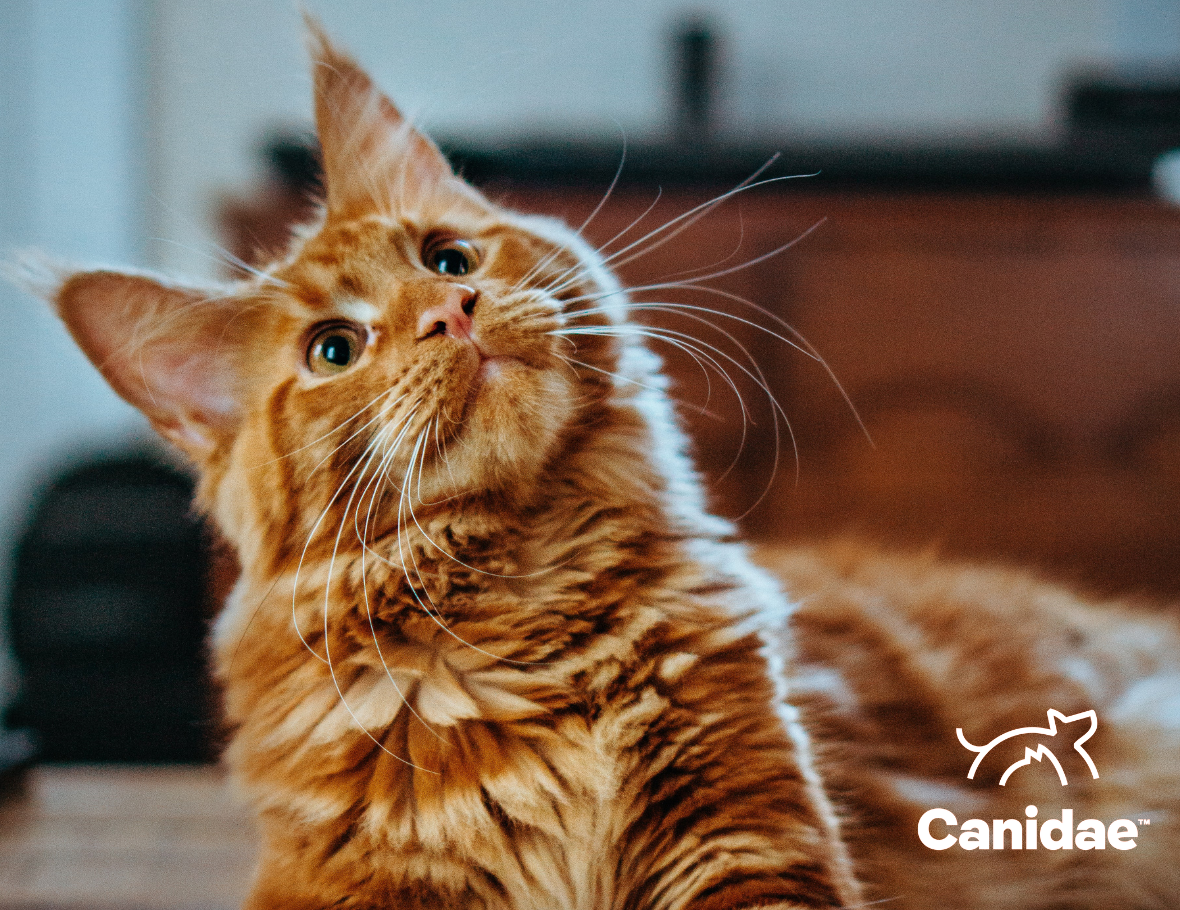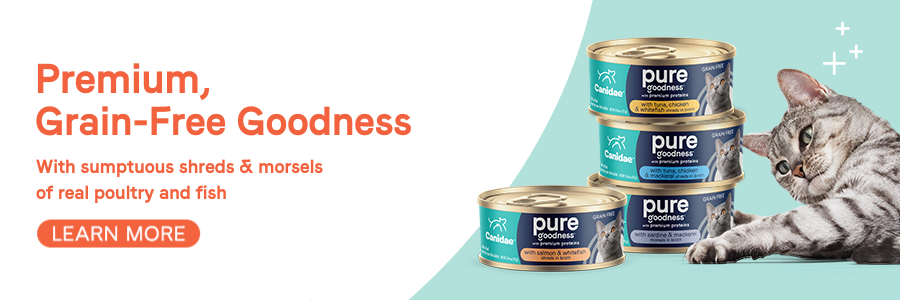Everything You Need to Know About Grain-Free Cat Food

You do what you can to make sure your cat lives its best life, but when it comes to diet things can get pretty confusing.
There are now more different types of cat food than ever before. Questions like “do cats prefer raw or cooked food?” and “is it OK to feed my cat a raw food diet?” leave us resembling our favorite feline as we scratch our heads. And that’s before we even begin to get into limited-ingredient diets and freeze-dried cat foods!
Still, one of the most polarizing debates centers around grain-free cat food, with both sides feeling strongly about the advantages and disadvantages of grain-free pet foods.
So, join us as we unpack the question of “to grain free, or not to grain free?”
What Does Grain-Free Mean?
First things first, what exactly is grain-free cat food? Don’t worry, this isn’t a trick question — cat food that doesn’t contain wheat, corn, oats, rice, rye or barley is by definition grain-free.
If it’s grain-free, that means it also doesn’t include any grain by-products like starch and gluten. If that word is setting off your allergy alarm bells, don’t worry — gluten allergies are incredibly rare in cats. Still, if you want gluten-free cat food, find a recipe that does not contain gluten-containing ingredients such as wheat.
Grain-Free, Since When?
Even though we’re very different species, foods for dogs and cats can often mirror human food trends. In the early 2000s when low-carb diets became all the rage, the pet food industry followed suit and there was a surge in low carb high protein recipes.
Likewise, in the 2010s when gluten-free diets picked up steam, pet parents also began to look for grain-free foods for their animals.
However, it’s important to remember that just because something is good for humans, doesn’t mean it’s also good for other animals.
Is Grain-Free Good for Cats?
As we mentioned earlier, there is a big debate about the value of a grain-free diet. To help you understand both sides, let’s take a look at the main arguments.
The Case for a Grain-Free Diet
Have you ever seen a lion eating rice? Or a panther chomping on some oats? Some people believe that since wild cats don’t eat grains, there’s no reason for their descendants to eat them.
Critics may respond by pointing out that wild animals don’t have nutritionists at hand to advise them. Just because a wild animal largely eats meat doesn’t mean meat alone is their perfect diet.
Likewise, even though wild cats and dogs don’t typically eat starches, studies show that domestic pets can digest more than 95% of starches. Whether this is the result of domestication or something else is up for debate, but it’s important to know what your pet is capable of!
The Case for a Grain-Inclusive Diet
Grains provide your cat with fiber and important nutrients such as iron, calcium, niacin and riboflavin. Critics of grain-free diets believe that swapping grains out for other carbohydrates could lead to a deficiency of these nutrients. A lack of fiber can result in gastrointestinal issues and your cat coughing up more hairballs.
Can a Grain-Free Diet Help My Cat Lose Weight?
Just because a food or a product is grain-free doesn’t mean it will help your cat shed some of those excess pounds! Grains are often replaced with other carbohydrates like potatoes, carrots, sweet potatoes, peas or beans. And even if a grain-free pet food is lower in carbs, there’s nothing to stop it from having higher levels of fats and calories.
Are No-Grain Cat Foods High in Protein?
Grain-free foods vary in their levels of protein. If you want to know exactly how much protein a food is packing, you’ll have to check the packaging.
Unlike other animals, a cat’s primary energy source is protein. Despite this, not all of their protein needs to be from meat — cats are very capable of digesting plant ingredients too.
Cat food that only uses meat as a protein source can be higher in phosphorus. While phosphorus is an essential nutrient, too much of it may be bad for your cat’s health. Studies suggest that there is a link between excessive phosphorus and the progression of chronic kidney disease in cats.
Grains provide essential amino acids and can be a low-phosphorus supplement to meat.
Should My Cat Eat Grain-Free Food?
Veterinarians tend to agree that grain-free diets aren’t necessary for most cats. That doesn’t mean that grain-free foods are by definition bad for your cat, just that they might not need them to be healthy.
If you choose a reputable pet food brand, the formulas they provide should be designed to keep your cat happy and healthy for a long time — regardless of whether they are grain-free or grain-inclusive.
The fact of the matter is that some cats aren’t always in perfect health. In certain cases, such as when a cat has an inflammatory bowel disease (IBD), a grain-free diet may help alleviate their symptoms, but it’s important to ask your vet before making any changes to your cat’s diet.
Is My Cat Allergic to Grains?
Humans are quick to jump the gun when talking about allergies. While 20% of adults claim to have food allergies, only 10% really have one. Just like we jump to conclusions about our own bodies, it’s possible that we’re doing the same thing with our cherished pets. Pet parents often make changes to their cat’s diet after following a hunch or listening to someone who isn’t fully qualified in the matter.
It’s important to mention that with adult cats and dogs, food allergies in general are much rarer than we think. It’s also worth noting that the majority of these food allergies are to protein sources such as beef, chicken and fish, rather than to carbohydrates like grains.
Scientific research supports the idea that grain allergies are not so common. One study found that corn was one of the least likely sources of a food allergy in cats. Out of 56 allergy-suffering cats that were studied, only four were allergic to corn, compared to 45 that suffered from beef, dairy or fish allergies.
If you suspect your cat has an allergy, your first port of call should be to go to your veterinarian. They will be able to examine your pet and if they believe a food allergy is the cause of your cat’s symptoms, they may recommend an elimination trial. Elimination trials are a tried and tested method for identifying food allergies in pets.
It’s natural that we want the best for our pets, which is why at Canidae® we work closely with a board-certified veterinary nutritionist to develop recipes that keep your cat healthy and happy.
We have a range of grain-free and grain-inclusive formulas that will leave your cat begging for more! For a grain-free option check out PURE Wet Cat Food: Salmon and Whitefish in Broth. This delicious recipe features chunks of salmon and whitefish along with added vitamins and minerals to support your cat’s overall wellness.
If you’re going grain-inclusive, try our Goodness for Digestion: Dry Cat Food with Real Chicken recipe. It has real chicken as the first ingredient and is rich in fiber from barley and flaxseeds to support healthy digestion.
Think about switching your cat to Canidae’s delicious recipes today!

